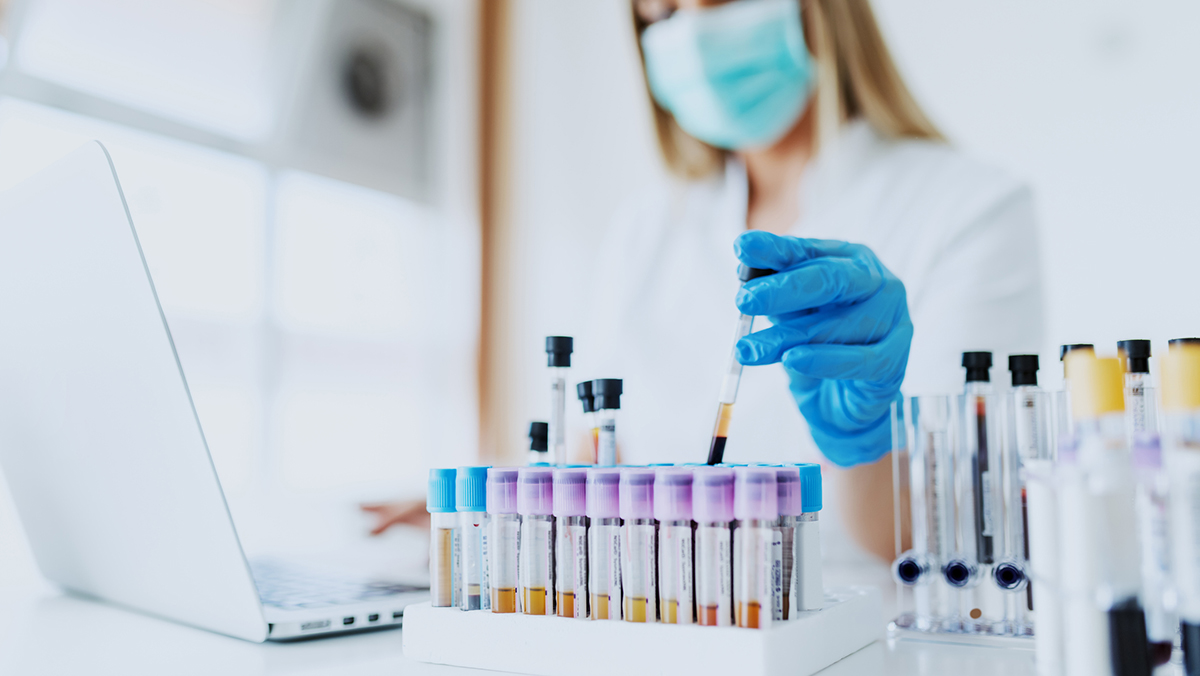The future of AI drug discovery & development in immunology and GPCR research

Alphabet subsidiary and precision health company Verily recently announced a breakthrough in its AI drug discovery GPCR research collaboration with Sosei Heptares.
A mere six months ago Verily launched the study with Sosei Heptares – a global leader in GPCR structure-based drug design – with an aim to “prioritise protein targets for therapeutic targeting in immune-mediated disease”. Now, Verily has announced that early results from its “next generation immune mapping technology” Immune Profiler platform have already identified “more effective therapeutic options against G protein-coupled receptors (GPCR) in autoimmune and other immune-mediated diseases”.
The companies hope that in the year to come those data targets will be entered for validation, hit generation, and lead selection. With approximately one third of all current FDA-approved drugs targeting GPCRs, Verily/Sosei Heptares are looking to expedite GPCR research within not only immunology, but also gastroenterology and immuno-oncology as well, and the latest data bodes well for future development of therapeutic options in these areas.
Human-first precision health
Pharmaphorum asked Charlie Kim, head of molecular science at Verily (which takes a “human-first precision approach to drug target discovery”), to expand on the details of the recent collaborative findings and what they mean for the future of the Verily/Sosei Heptares partnership, as well as where he thinks AI’s use in drug discovery and development might lead the industry.
Verily’s Immune Profiler platform is “a discovery engine consisting of proprietary immune profiling lab workflow, growing multi-omic database, and advanced analytical tools”. The purpose of collaborating with Sosei Heptares, Kim told pharmaphorum, was to streamline definition of those GPCR targets worth studying, while substantially reducing human hours spent trawling through data.
Granted, it’s an ambitious scientific undertaking, and one “aimed squarely at developing new and more effective therapeutic options for autoimmune and other immune-mediated diseases.” Essentially, the collaboration brought together both “the right expertise and the right technology”, opening up myriad possibilities for targeting GPCRs within the human genome.
Verily’s Immune Profiler can, Kim asserted, “generate more than 8 million immune measures across 24 immune cell subsets”. What this means is that it lays pretty firm foundations for identifying new drug targets and, coupled with Sosei Heptares’ expertise, researchers have been able to reveal “a number of priority targets with known links to autoimmune diseases that were not high on anyone’s radar until now”.
Next, they need experiential evidence that will support progressing these revealed prioritised targets into the discovery of lead molecules.
Technological breakthroughs in molecular biology
Kim was inspired by the “host of technological breakthroughs in molecular biology in the late 90s”, when he was beginning his PhD at Stanford University. It was a time when “the potential for systematic understanding of complex biology was palpable”, a fascinating terrain wherein the “first bacterial genomes were being sequenced”, when microarray technology was in the early stages of being invented, and ‘genomics’ and ‘big data’ certainly weren’t on the tips of people’s tongues.
Kim recognised then, he said, that better tools for medicine needed to be developed, and that they still do. Citing the transformative therapies available for targets such as tumour necrosis factor (TNF), the pro-inflammatory cytokine interleukin-23 (IL-23), and programmed cell death protein 1 (PD-1) – he explained that “these drugs only achieve the best outcomes in a minority of patients with autoimmunity or cancer”. What, then, is the solution?
Well, Kim believes that “by leveraging the power of genetics and functional genomics, coupled with a ‘human-first’ mindset, innovative analytics, and scalable compute power” there is “the ability to take a fundamentally different approach to drug development”. It also bodes well for improving clinical trial success rates. Indeed, Verily’s Immune Profiler prioritises targets with “multiple lines of evidence” by specifically using “multi-omic integration of evolutionary selected genetic signals and their associated functional impacts to construct models of human immunology”. The company also hopes the platform will be able “to identify better biomarkers and diagnostic tools”.
Efficiency and cost-effectiveness are key drivers in these recent developments in AI drug discovery and development, given that R&D for a new drug can take up to 18 years. The overarching desire to reduce in some way the “translational valley of death” of failed clinical trials is palpable. But mere volition does not enact results. Back in January 2020, Exscientia and Sumitomo Dainippon partnered on the AI-created drug molecule DSP-1181 for obsessive compulsive disorder (OCD): the development had taken their AI only 12 months to go to trial. However, by July 2022 it was revealed that DSP-1181 didn’t even pass the phase 1 study and, furthermore, had exhibited “insufficient novelty” (bearing considerable similarity to haloperidol, the antipsychotic drug FDA-approved in 1967).
AI drug discovery in immunology today, and tomorrow
AI relies on data. Speed and cost-effectiveness are one thing, but without good data to act upon, results are meaningless. Noting that AI has been used successfully in diagnostic breakthroughs in oncology thus far, Kim reminded us that when it comes to autoimmune diseases, such “predictive and accurate diagnostic tests […] are still in their infancy”.
As Kim makes very clear, “[i]mmune-mediated diseases are highly complex and, oftentimes, therapies that work for one patient may not be effective for another”. What the Immune Profiler platform does is “broaden the ability to identify potential places where new therapies could be found”. It is the horizon looker, seeing far more – and, at that, far more expediently – than the human researcher alone ever could.
A notable issue with clinical trials is the homogeneity of the patient database. Whilst many are rightly calling for a diversification and equitisation of clinical trial participation, it doesn’t yet change the fact that the pharma industry uses clinical research organisation (CRO)-provided information, which itself can only draw from the patient-provided data available – patient data which isn’t always particularly diverse.
Precision health, then, seeks to create “the greatest number of options possible”, as well as “make sure every patient has the most targeted treatment for their condition, physiology, and more”. The artificial intelligence in Verily/Sosei Heptares’ case uses advanced data analytics to search for molecules to test in the first place. Undertaking that needle-in-a-haystack task, the AI looks for something, anything – until it finds it. As Kim admits, “[n]ot all of them will bear fruit – but some, even maybe many, will – and that’s why it’s so critical for us to be here right now”.
Verily and Sosei Heptares hope their collaboration will eventually help those people currently living with immune-mediated diseases who are dissatisfied with their current treatment, or unable to undergo the currently available therapies for their condition, by “unlocking novel therapeutic options”. It is not a method that will yield tangible results tomorrow, but with further investigation and even molecule generation projected within the next year, as Kim, said: “In pharmaceutical R&D, that is certainly moving at a very fast clip.”
About the interviewee
 Dr. Charlie Kim earned his PhD from Microbiology and Immunology at Stanford University and pioneered the application of genomic and bioinformatic approaches to the study of infectious disease. He joined the faculty of the UCSF Department of Medicine in 2011, where he expanded his focus to the application of immunogenomic approaches to translational research. In 2015, he joined Verily to further these goals in the powerful compute environment of the Google ecosystem. In his role as Head of Molecular Science, he leads teams responsible for innovating molecular platforms and applying them in translational research aimed at improving patient outcomes. He is the director of PRESCO, a multi-site observational severe COVID-19 outcomes study, and strives to bring powerful technologies to translational research with the goal of accelerating the development of therapeutics, biomarkers, and diagnostics that can improve patient outcomes through Precision Health.
Dr. Charlie Kim earned his PhD from Microbiology and Immunology at Stanford University and pioneered the application of genomic and bioinformatic approaches to the study of infectious disease. He joined the faculty of the UCSF Department of Medicine in 2011, where he expanded his focus to the application of immunogenomic approaches to translational research. In 2015, he joined Verily to further these goals in the powerful compute environment of the Google ecosystem. In his role as Head of Molecular Science, he leads teams responsible for innovating molecular platforms and applying them in translational research aimed at improving patient outcomes. He is the director of PRESCO, a multi-site observational severe COVID-19 outcomes study, and strives to bring powerful technologies to translational research with the goal of accelerating the development of therapeutics, biomarkers, and diagnostics that can improve patient outcomes through Precision Health.
If you liked this story, check out the related video below.













